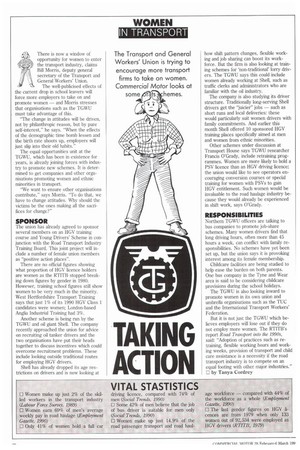TAKING ACTION
Page 30

If you've noticed an error in this article please click here to report it so we can fix it.
The Transport and General Workers' Union is trying to encourage more transport firms to take on women. Commercial Motor looks at some6Thts hemes.
There is now a window of opportunity for women to enter the transport industry, claims Bill Morris, deputy general secretary of the Transport and General Workers' Union.
sThe well-publicised effects of the current drop in school leavers will force more employers to take on and promote women — and Morris stresses that organisations such as the TGWU must take advantage of this.
"The change in attitudes will be driven, not by philanthropic reason, but by pure self-interest," he says. "When the effects of the demographic time bomb lessen and the birth rate shoots up, employers will just slip into their old habits."
The equal opportunities unit at the TGWU, which has been in existence for years, is already joining forces with industry to promote new schemes. It is determined to get companies and other organisations promoting women and ethnic minorities in transport.
"We want to ensure other organisations contribute," says Morris. "To do that, we have to change attitudes. Why should the victims be the ones making all the sacrifices for change?"
SPONSOR
The union has already agreed to sponsor several members on an HGV training course and Young Drivers' Scheme in conjunction with the Road Transport Industry Training Board. This joint project will include a number of female union members as "positive action places".
There are no official figures showing what proportion of HGV licence holders are women as the RTITB stopped breaking down figures by gender in 1980. However, training school figures still show women to be very much in the minority. West Hertfordshire Transport Training says that just 1% of its 1990 HGV Class 1 candidates were women; London-based Anglia Industrial Training had 3%.
Another scheme is being run by the TGWU and oil giant Shell. The company recently approached the union for advice on recruiting oil tanker drivers and the two organisations have put their heads together to discuss incentives which could overcome recruitment problems. These include looking outside traditional routes for employing HGV drivers.
Shell has already dropped its age restrictions on drivers and is now looking at how shift pattern changes, flexible working and job sharing can boost its workforce. But the firm is also looking at training schemes for 'non-traditional' lorry drivers. The TGWU says this could include women already working at Shell, such as traffic clerks and administrators who are familiar with the oil industry.
The company is also studying its driver structure. Traditionally long-serving Shell drivers get the "juicier" jobs — such as short runs and local deliveries: these would particularly suit women drivers with family commitments. And earlier this month Shell offered 10 sponsored HGV training places specifically aimed at men and women from ethnic minorities.
Other schemes under discussion at Transport House says TGWU researcher Francis O'Grady, include retraining programmes. Women are more likely to hold a PSV licence than an HGV driving licence; the union would like to see operators encouraging conversion courses or special training for women with PSVs to gain HGV entitlement. Such women would be invaluable to the road haulage industry because they would already be experienced in shift work, says O'Grady.
RESPONSIBILITIES
Northern TGWU officers are talking to bus companies to promote job-share schemes. Many women drivers find that long driving hours, often more than 45 hours a week, can conflict with family responsibilities. No schemes have yet been set up, but the union says it is provoking interest among its female membership.
Childcare facilities are being studied to help ease the burden on both parents. One bus company in the Tyne and Wear area is said to be considering childcare provisions during the school holidays.
The TGWU is also looking inward to promote women in its own union and umbrella organisations such as the TUC and the International Transport Workers' Federation.
But it is not just the TGWU which believes employers will lose out if they do not employ more women. The RTITB's report Road Transport into the 1990s, said: "Adoption of practices such as retraining, flexible working hours and working weeks, provision of transport and child care assistance is a necessity if the road transport industry is to compete on an equal footing with other major industries." CI by Tanya Cordrey












































































